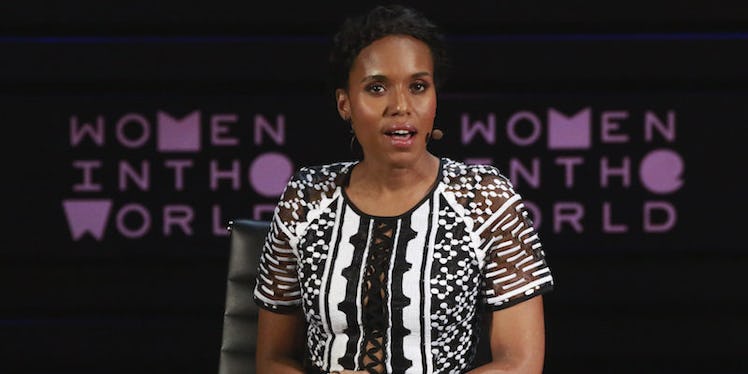
Kerry Washington Gets Real About Sexual Harassment In The Workplace
On Friday, Kerry Washington spoke on a panel at Tina Brown's Women in the World Summit in New York City about how Anita Hill changed the conversation on sexual harassment.
Washington portrays Hill in the upcoming HBO film "Confirmation." When Clarence Thomas was nominated to the Supreme Court by President George HW Bush in 1991, Hill said Thomas sexually harassed her when they worked together.
This story became public, and Hill had to testify about her experience. It was televised nationally.
At one point, Thomas said if he offended anyone, he apologized. At the panel on Friday, Washington talked about that moment, saying,
We use this term 'sexual harassment' right now so fluidly, so easily. Then, it was a vague legal term that no one understood.
Washington continued,
We all now live in a world where we regularly have sexual harassment trainings in our jobs. We have HR offices. We understand that harassment is not just about gender -- it's about sexual orientation and age and race and religion. There is a real understanding of that. Before these hearings, before Anita Hill came forward, there was not that understanding. There was not that understanding at all. It was part of the reluctance of the Senate Judiciary Committee to have the conversation, because if we admit that that behavior is inappropriate, what else is inappropriate? And that meant the game had to change.
Although Hill's testimonies progressed the conversation on sexual harassment, we've still got a ways to go.
Also during the panel, Sally Quinn, a reporter for The Washington Post, came forward with her own story.
When Quinn was a sophomore in college, she met Senator John Tower through her father, who was in the military. She said Tower invited her to dinner and attempted to rape her in a cab on the way back to her home.
Years later, in 1989, Tower was nominated to be secretary of defense by President Bush. The FBI came to Quinn and said they had heard about an attempted rape and wanted her to testify about it.
Quinn said,
I could have been Anita Hill.
Instead, however, Quinn did not come forward. She said she knew the story would become public, and she did not want to mark herself for the rest of her life.
Choosing to not come forward is still common. According to a recent study, 71 percent of women who have been harassed in the workplace do not come forward.
Washington said,
I do think this idea of, 'What is at stake if I tell the truth? What will I lose? I'll lose my reputation, I'll lose my career.' This is also complicated by the fact that Anita Hill was a woman of color, and so that intersectionality also made it twice as difficult for her to get a job, keep a job, maintain her career.
"Confirmation" is premiering in April.
Citations: Survey: 1 in 3 Women Has Been Sexually Harassed at Work (Cosmopolitan)